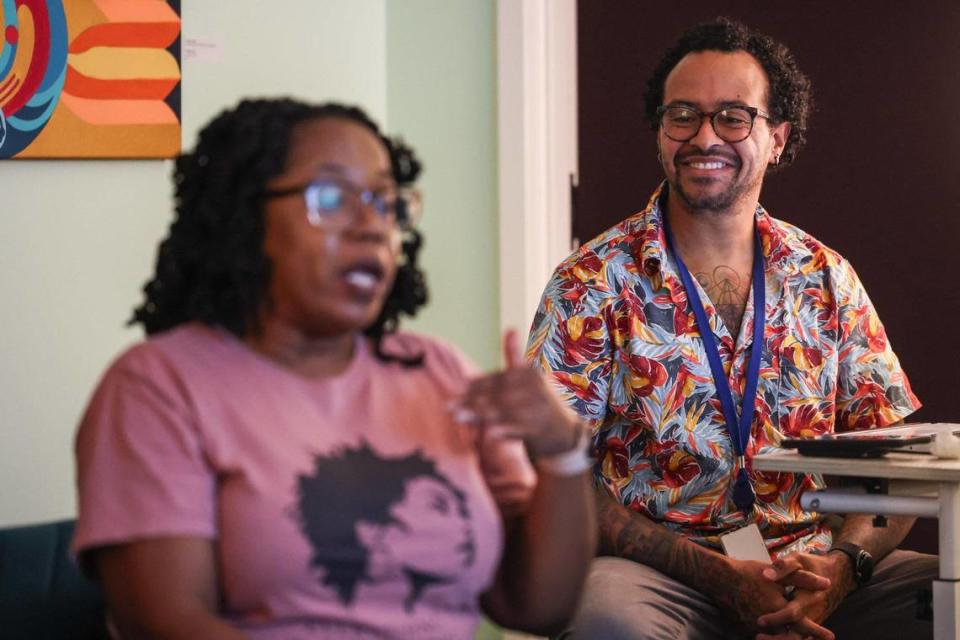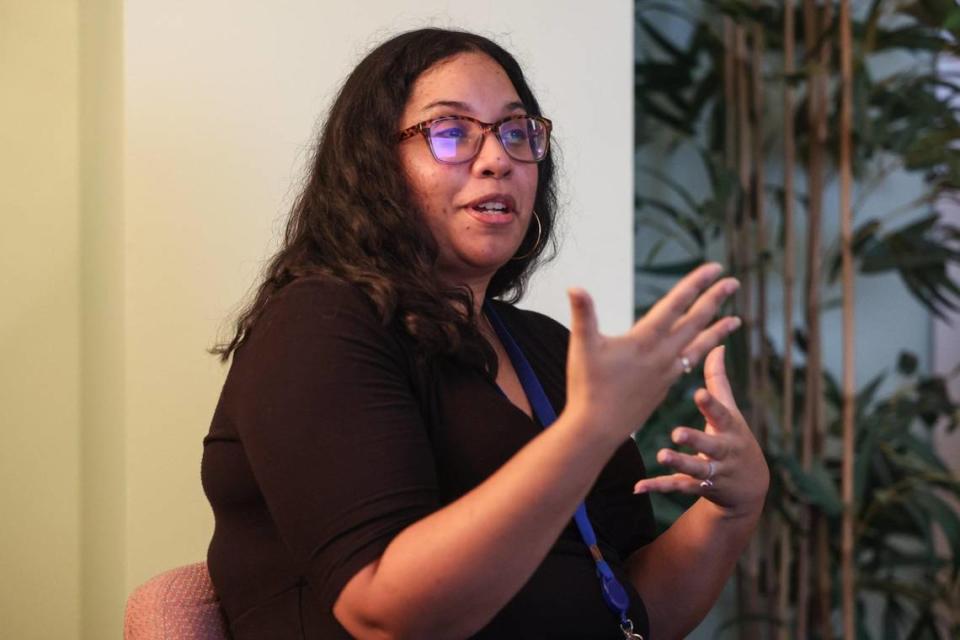From a basement in Charlotte to the NC statehouse: Psychedelic therapy gets a new look
North Carolina legislators are considering a new law that would allow some hospitals to offer psychedelic drug therapy to patients with post traumatic stress disorder.
One organization in Charlotte is already doing what it can to offer this therapy short of providing the substances and supervising those consuming MDMA or pscilocybin.
Psychedelic mushrooms contain psilocybin, a chemical that can induce hallucinogenic experiences. MDMA, sometimes referred to as ecstasy, is a stimulant and hallucinogen. Both substances have shown promise in scientific studies as a breakthrough treatment for PTSD and depression, according to researchers writing for the World Journal of Psychiatry.
In North Carolina, the “Breakthrough Therapies Research/Advisory Act” would allocate $5 million in funding to two medical or academic organizations in the state to test the impact of MDMA and psilocybin on treating mental health conditions.
The bill was first introduced in April by Reps. Wayne Sasser, Allen Chesser, and John Autry. Sasser, a Republican, represents Montgomery and Stanly counties. Chesser, a Republican, represents Nash County. Autry is a Mecklenburg Democrat.
Sasser is the only pharmacist in the state legislature and he became an advocate for psilocybin after learning that it can help veterans with PTSD.
“It’s just an opportunity for us to look after the people that we’ve put in harm’s way,” Sasser told The Charlotte Observer. “We owe those people an opportunity to put all this behind them.”
It is unlikely the bill will pass this session, Sasser said.
“Without a doubt, it’ll be something we’ll put more focus on in the short session and try to get the word out better,” Sasser said.
States with psychedelic drug therapy
Colorado and Oregon are the only two states that have legalized the use of psilocybin in therapy.
Approximately 15 other states have introduced legislation that would fund research into the substances, mostly for medical purposes, and at least six others have decriminalized or reduced penalties for possession of the drugs, according to legislation tracker Psychedelic Alpha.
While Sasser’s advocacy for the bill has a strong focus on veterans, Cohoba — a nonprofit in Charlotte advocating for the legal availability of the treatment — hopes it will help marginalized communities, including immigrants and survivors of sexual assault.

The organization provides talk therapy before and after psychedelic experiences and offers massage therapy. Trained social workers provide harm reduction information to those interested in psychedelics.
Laura Camilo Apgar and Daniel De La Cruz, clinical social workers and co-founders of Cohoba, say the communities they work with could benefit from the therapy. But because the drugs are illegal, they may not be able to access the care safely.
“I’ve spun the block in the psychedelic field and I think there’s a lot of really great things and I think there’s some potentially quite dangerous things that could happen too,” Camilo Apgar said. “So not being able to have oversight, knowing that it is just just kind of happening in the wild, I would like to be able to have more clarity and more transparency. But when something’s criminalized, that’s very hard to do.”
MDMA and psilocybin side effects
While fatal overdoses on MDMA and psilocybin are rare, if ingested improperly or in excess the substances can still be dangerous. An MDMA overdose can result in abnormal heart rate, body temperature dysregulation, hyperthermia (overheating), and seizures, according to American Addiction Centers.
Psilocybin overdose is very rare but if a large amount is consumed someone can experience symptoms like agitation, vomiting, diarrhea, muscle weakness, paranoia, psychosis, seizures, and coma, according to the Harm Reduction Center.
In June, the Food and Drug Administration issued its first ever guidance on how to conduct clinical trials for psychedelic drugs. Along with this guidance, officials with the FDA said psychedelics show “initial promise as potential treatments for mood, anxiety and substance use disorders.”
This decision by the FDA differs drastically from guidance provided by the Drug Enforcement Agency which emphasizes psilocybin is illegal under the Controlled Substances Act.
“It has a high potential for abuse, no currently accepted medical use in treatment in the United States, and a lack of accepted safety for use under medical supervision,” according to the DEA.
Sasser says those who oppose research into the therapies often don’t understand what it will mean for their community.
He said there is a misconception among some North Carolina constituents and legislators that the passage of the bill will mean drugs will be legalized and brought into their community.
“It’s just a treatment, and it’s a very specific treatment, and it’s handled very professionally, it’s FDA approved. And there’s no reason that we’re not doing this,” Sasser said.
Psychedelics can provide valuable therapy and treatment to those struggling with their mental health and criminalizing the drugs does more harm than good, advocates such as Camilo Apgar and De La Cruz say.
What is Cohoba?
Neither Camilo Apgar nor De La Cruz imagined they would work with psychedelics until they had personal encounters with the substances that changed their lives.
Camilo Apgar was in her 20s and planned to become a journalist when she had her first experience with psilocybin. She said she was struggling with her mental health and was doing well in school but was depressed and miserable.

“I knew something was wrong, I didn’t really know what and looking back, that very small dose of psilocybin mushrooms, it just did something to me and my sense of self and my understanding of self,” Camilo Apgar said.
“I had not touched that kind of possibility since childhood.”
The experience was so impactful for Camilo Apgar that she decided to study the use of psychedelics in therapy, specifically how the substances could help immigrant populations and underrepresented communities.
De La Cruz had a similar experience, and his first exposure to psychedelics was a dose of LSD — a hallucinogen — when he was 27-years-old and studying social work.
At the time, he was going through a traumatic divorce, navigating split-custody of his child, and became depressed. At one point, he lost 40 pounds and his cousin offered him the drug.
“I had a really transformative experience on LSD,” De La Cruz said. “I had a psychedelic octopus, in my mind’s eye, introduce the concept of loving myself, which I had never really thought of.”
De La Cruz, like Camilo Apgar, began studying psychedelic therapy as a result of his experience. When the two met in 2015, they were determined to develop a community organization that could offer the therapy.
De La Cruz and Camilo Apgar are both Dominican-American and believe that psychedelic therapy could strongly help members of Charlotte’s immigrant community who may be struggling with trauma.
“We know that these medicines, a lot of times, are extracted from Black and Brown communities. And so we wanted to make sure that we offer services to people from people that look like them,” De La Cruz said.
The name Cohoba originates from the Taino word for a psychedelic snuff ceremony. The Tainos were the native peoples of the Caribbean, De La Cruz said. He said they wanted to make the name a nod to their ancestry.
Cohoba became a registered 501(c)(3) non-profit in 2019 and is located in the basement of the Visual and Performing Arts Center in uptown Charlotte.
Providers with the organization cannot currently supervise anyone under the influence of psychedelics and cannot provide them or point anyone in the direction of where to obtain the drugs, but they hope that in the future, if there is a change to state law they can provide this support.
In the meantime, Cohoba’s providers are taking courses to become certified to offer ketamine therapy, which can have similar but shorter-lasting effects as psychedelics. Camilo Apgar said the group hopes to offer the therapy at the beginning of next year and would be able to directly provide and supervise use of the substance.
Cohoba meets on the last Wednesday of each month from 6-8 p.m.
The group will not have a meeting in September but will instead host its second annual “CohobaFest” to raise funds and awareness for the therapy. The Sept. 23 event will be held at GreenLife Family Farms in Concord and will feature vendors, speakers, art and food trucks from 12 to 10 p.m.

